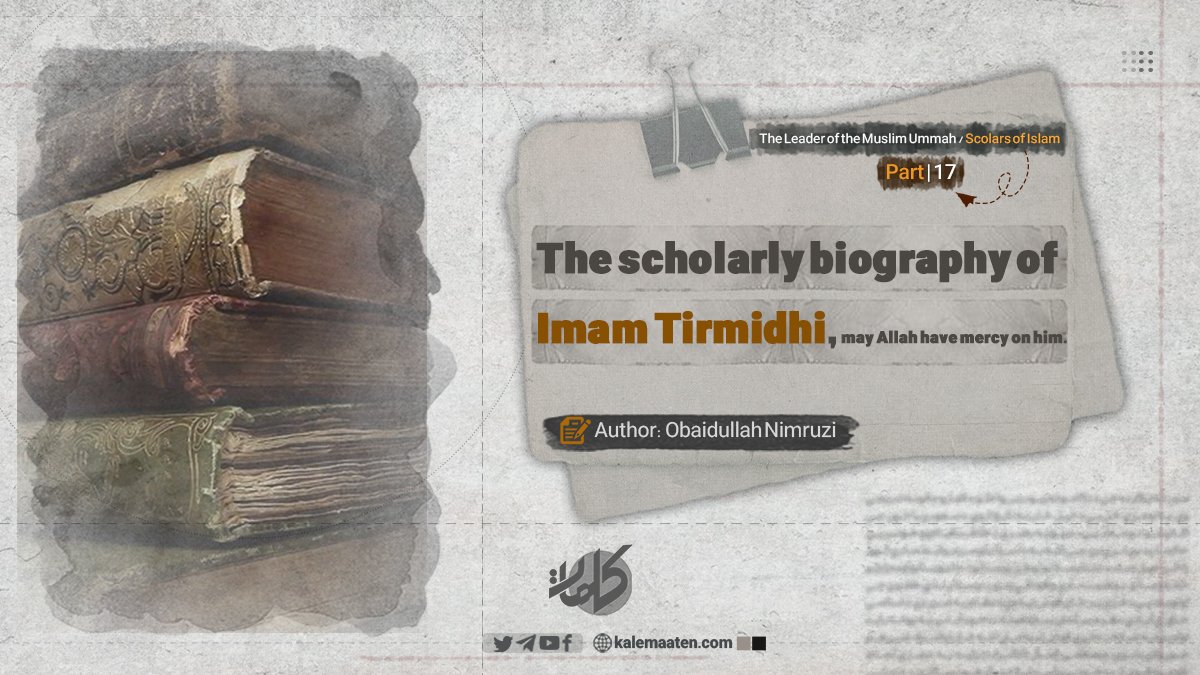
Author: Obaidullah Nimruzi
The Scholarly Biography of Imam Tirmidhi ‘may Allah have mercy on him’ (Part 17)
Compilation of Hadith
According to the deniers of Hadith, since the compilation of Hadiths took place in the third century AH, it cannot be trusted that Hadiths are preserved in their original form. However, this is a completely baseless misrepresentation. The preservation of Hadith from the time of the Prophet until now has not depended solely on writing. Based on research, it appears that the preservation of Hadiths during the time of the Prophet and the Sahaba was done in three ways:
1. Preservation of Narration: The first method of preserving Hadiths is to memorize them. This method was especially reliable at that time because Allah Almighty had granted the Arabs unusually strong memories. They wrote not only their own lineages but also the lineages of their horses. Some individuals had memorized thousands of verses of poetry and could retain a speech after hearing it just once, keeping it in their memory for many years. Numerous examples of the strong memories of this people have been documented in history.
In Sahih Bukhari, a narration is attributed to Hazrat Ja’far bin Abdullah Al-Dhamri, who said: “Once I met Hazrat Wahshi (may Allah be pleased with him) along with Hazrat Ubaydullah bin Adi bin Khayyar. Ubaydullah asked Hazrat Wahshi (may Allah be pleased with him) if he knew him. Hazrat Wahshi (may Allah be pleased with him) replied: I do not know you, but I remember that several years ago I went to that person named Ubaydullah bin Khayyar. At that time, a baby was born in his family. I wrapped the baby in a blanket and took him to a physician. The baby’s entire body was covered, leaving only its feet visible. Your feet are very similar to this child’s feet.”
Additionally, Hafiz Ibn Hajar (may Allah have mercy on him) reports in his book Al-Asaba that one day Abdul Malik bin Marwan tested Hazrat Abu Hurairah (may Allah be pleased with him)’s memory by asking him to narrate some Hadiths. Hazrat Abu Hurairah (may Allah be pleased with him) immediately began narrating numerous Hadiths, which a scribe wrote down on behalf of Marwan. A year later, Abdul Malik Marwan asked Hazrat Abu Hurairah (may Allah be pleased with him) to recite all the Hadiths of the previous year in the same order, and the scribe recorded them again. Hazrat Abu Hurairah (may Allah be pleased with him) narrated all the Hadiths in the same order without any delay or alteration.
2. Interaction: The second method of preserving Hadiths that the Sahaba (may Allah be pleased with them) adopted was through “interaction”; that is, they acted upon the actions and sayings of the Messenger of Allah (peace and blessings of Allah be upon him) and memorized them accordingly. It is well known that the Sahaba (may Allah be pleased with them) used to say: “This is what I saw the Messenger of Allah (PBUH) doing.”
3. Writing: The preservation of Hadiths was also accomplished through writing. Historically, the writing of Hadiths can be divided into four stages:
1. Recording Hadiths in a scattered fashion.
2. Writing in personal notebooks.
3. Compiling Hadiths into a manuscript without chapters.
4. Compiling Hadiths into a manuscript with chapters.
During the era of the Holy Prophet (PBUH), the first two types of writing were quite common. The deniers of Hadith deny that writing was done during the Prophet’s time (peace and blessings of Allah be upon him) and argue, based on authentic narrations from Muslim and other sources, that the Prophet (peace and blessings of Allah be upon him) forbade writing: “Do not write about me, and whoever writes about me other than the Qur’an, let him erase it.”
However, in Mustadrak al-Hakim, it is narrated from Abdullah ibn Umar (may Allah be pleased with him) that the Prophet (peace and blessings of Allah be upon him) said: “Record knowledge; write down knowledge.”
Some of the pages prepared during the time of the Sahaba include:
– The page of Ali (may Allah be pleased with him): In the Sunan of Abu Dawood, it is narrated from Ali (may Allah be pleased with him): “What we wrote about the Messenger of Allah (PBUH) is the Qur’an and what is in this document.”
– Kitab al-Sadaqah: This book contains a compilation of Hadiths dictated by the Holy Prophet (peace and blessings of Allah be upon him and his family), explaining rulings on zakat, almsgiving, tithes, etc. The narration of this book is mentioned in Sunan Abu Dawood.
The era of Hazrat Umar ibn Abdul Aziz (may Allah have mercy on him): During Hazrat Umar ibn Abdul Aziz’s (may Allah have mercy on him and his family) era, the official compilation of Hadith began. He wrote a letter to the judge of Medina, Abu Bakr ibn Hazm, ordering him to: “Consider what is in the Hadith of the Messenger of Allah (peace and blessings of Allah be upon him and his family) and write it down, lest the lessons of knowledge and the journeys of scholars diminish.”
During this period, large-scale collection and compilation of Hadith commenced, leading to the compilation of books such as Kitab al-Athar by Imam Abu Hanifa and Muwa’ta by Imam Malik. Kitab al-Athar was the first book to arrange Hadiths according to jurisprudential chapters, selected by Imam Abu Hanifa (may Allah have mercy on him) from among forty thousand Hadiths. This book is referenced in Al-Muwafeqat by Imam Shatibi.
Continues…


